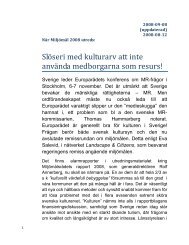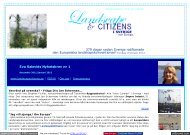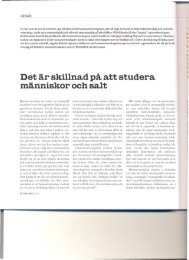Landscape through literature Le paysage à travers la littérature
Landscape through literature Le paysage à travers la littérature
Landscape through literature Le paysage à travers la littérature
Create successful ePaper yourself
Turn your PDF publications into a flip-book with our unique Google optimized e-Paper software.
ii) to analyse their characteristics and the forces<br />
and pressures transforming them;<br />
iii) to take note of changes;<br />
b. to assess the <strong>la</strong>ndscapes thus identified, taking into<br />
account the particu<strong>la</strong>r values assigned to them by<br />
the interested parties and the popu<strong>la</strong>tion concerned.<br />
2. These identification and assessment procedures shall<br />
be guided by the exchanges of experience and methodology,<br />
organised between the Parties at European<br />
level pursuant to Article 8.<br />
D. <strong>Landscape</strong> quality objectives<br />
Each Party undertakes to define <strong>la</strong>ndscape quality objectives<br />
for the <strong>la</strong>ndscapes identified and assessed, after<br />
public consultation in accordance with Article 5.c.<br />
E. Implementation<br />
To put <strong>la</strong>ndscape policies into effect, each Party undertakes<br />
to introduce instruments aimed at protecting,<br />
managing and/or p<strong>la</strong>nning the <strong>la</strong>ndscape.<br />
Chapter III – European Co-operation<br />
Article 7 – International policies and programmes<br />
Parties undertake to co-operate in the consideration of<br />
the <strong>la</strong>ndscape dimension of international policies and<br />
programmes, and to recommend, where relevant, the<br />
inclusion in them of <strong>la</strong>ndscape considerations.<br />
Article 8 – Mutual assistance and exchange<br />
of information<br />
The Parties undertake to co-operate in order to enhance<br />
the effectiveness of measures taken under other articles<br />
of this Convention, and in particu<strong>la</strong>r:<br />
a. to render each other technical and scientific assistance<br />
in <strong>la</strong>ndscape matters <strong>through</strong> the pooling and exchange<br />
of experience, and the results of research projects;<br />
b. to promote the exchange of <strong>la</strong>ndscape specialists in<br />
particu<strong>la</strong>r for training and information purposes;<br />
c. to exchange information on all matters covered by<br />
the provisions of the Convention.<br />
Article 9 – Transfrontier <strong>la</strong>ndscapes<br />
The Parties shall encourage transfrontier co-operation<br />
on local and regional level and, wherever necessary,<br />
prepare and implement joint <strong>la</strong>ndscape programmes.<br />
Article 10 – Monitoring of the implementation<br />
of the Convention<br />
1. Existing competent Committees of Experts set up under<br />
Article 17 of the Statute of the Council of Europe shall<br />
be designated by the Committee of Ministers of the<br />
Council of Europe to be responsible for monitoring<br />
the implementation of the Convention.<br />
2. Following each meeting of the Committees of Experts,<br />
the Secretary General of the Council of Europe shall<br />
transmit a report on the work carried out and on the<br />
operation of the Convention to the Committee of Ministers.<br />
3. The Committees of Experts shall propose to the<br />
Committee of Ministers the criteria for conferring and<br />
the rules governing the <strong>Landscape</strong> award of the Council<br />
of Europe.<br />
Article 11 – <strong>Landscape</strong> award of the Council of Europe<br />
1. The <strong>Landscape</strong> award of the Council of Europe is a<br />
distinction which may be conferred on local and<br />
regional authorities and their groupings that have<br />
instituted, as part of the <strong>la</strong>ndscape policy of a Party<br />
to this Convention, a policy or measures to protect,<br />
manage and/or p<strong>la</strong>n their <strong>la</strong>ndscape, which have<br />
proved <strong>la</strong>stingly effective and can thus serve as an<br />
example to other territorial authorities in Europe. The<br />
distinction may be also conferred on non-governmental<br />
organisations having made particu<strong>la</strong>rly remarkable<br />
contributions to <strong>la</strong>ndscape protection,<br />
management or p<strong>la</strong>nning.<br />
2. Applications for the <strong>Landscape</strong> award of the Council<br />
of Europe shall be submitted to the Committees of<br />
Experts mentioned in Article 10 by the Parties. Transfrontier<br />
local and regional authorities and groupings<br />
of local and regional authorities concerned, may apply<br />
provided that they jointly manage the <strong>la</strong>ndscape in<br />
question.<br />
3. On proposals from the Committees of Experts<br />
mentioned in Article 10 the Committee of Ministers<br />
shall define and publish the criteria for conferring the<br />
<strong>Landscape</strong> award of the Council of Europe, adopt the<br />
relevant rules and confer the Award.<br />
4. The granting of the <strong>Landscape</strong> award of the Council<br />
of Europe is to encourage those receiving the award<br />
to ensure the sustainable protection, management<br />
and/or p<strong>la</strong>nning of the <strong>la</strong>ndscape areas concerned.<br />
(Abstract)<br />
www.coe.int/European<strong>Landscape</strong>Convention<br />
Convention européenne du <strong>paysage</strong><br />
Florence, 20 octobre 2000<br />
Préambule<br />
<strong>Le</strong>s Etats membres du Conseil de l’Europe, signataires<br />
de <strong>la</strong> présente Convention,<br />
Considérant que le but du Conseil de l’Europe est de<br />
réaliser une union plus étroite entre ses membres, afin de<br />
sauvegarder et de promouvoir les idéaux et les principes<br />
qui sont leur patrimoine commun, et que ce but est poursuivi<br />
en particulier par <strong>la</strong> conclusion d’accords dans les<br />
domaines économique et social;<br />
Soucieux de parvenir <strong>à</strong> un développement durable fondé<br />
sur un équilibre harmonieux entre les besoins sociaux,<br />
l’économie et l’environnement;<br />
Notant que le <strong>paysage</strong> participe de manière importante<br />
<strong>à</strong> l’intérêt général, sur les p<strong>la</strong>ns culturel, écologique, environnemental<br />
et social, et qu’il constitue une ressource<br />
favorable <strong>à</strong> l’activité économique, dont une protection,<br />
une gestion et un aménagement appropriés peuvent<br />
contribuer <strong>à</strong> <strong>la</strong> création d’emplois;<br />
Conscients que le <strong>paysage</strong> concourt <strong>à</strong> l’é<strong>la</strong>boration des<br />
cultures locales et qu’il représente une composante fondamentale<br />
du patrimoine culturel et naturel de l’Europe,<br />
contribuant <strong>à</strong> l’épanouissement des êtres humains et <strong>à</strong> <strong>la</strong><br />
consolidation de l’identité européenne;<br />
Reconnaissant que le <strong>paysage</strong> est partout un élément<br />
important de <strong>la</strong> qualité de vie des popu<strong>la</strong>tions: dans les<br />
milieux urbains et dans les campagnes, dans les territoires<br />
dégradés comme dans ceux de grande qualité, dans les<br />
espaces remarquables comme dans ceux du quotidien;<br />
Notant que les évolutions des techniques de productions<br />
agricole, sylvicole, industrielle et minière et des pratiques<br />
en matière d’aménagement du territoire, d’urbanisme,<br />
de transport, de réseaux, de tourisme et de loisirs, et,<br />
plus généralement, les changements économiques<br />
mondiaux continuent, dans beaucoup de cas, <strong>à</strong> accélérer<br />
<strong>la</strong> transformation des <strong>paysage</strong>s;<br />
Désirant répondre au souhait du public de jouir de<br />
<strong>paysage</strong>s de qualité et de jouer un rôle actif dans leur transformation;<br />
Persuadés que le <strong>paysage</strong> constitue un élément essentiel<br />
du bien-être individuel et social, et que sa protection, sa<br />
gestion et son aménagement impliquent des droits et des<br />
responsabilités pour chacun;<br />
Ayant <strong>à</strong> l’esprit les textes juridiques existant au niveau international<br />
dans les domaines de <strong>la</strong> protection et de <strong>la</strong><br />
gestion du patrimoine naturel et culturel, de l’aménagement<br />
du territoire, de l’autonomie locale et de <strong>la</strong> coopération<br />
transfrontalière, notamment <strong>la</strong> Convention re<strong>la</strong>tive<br />
<strong>à</strong> <strong>la</strong> conservation de <strong>la</strong> vie sauvage et du milieu naturel<br />
de l’Europe (Berne, 19 septembre 1979), <strong>la</strong> Convention<br />
pour <strong>la</strong> sauvegarde du patrimoine architectural de l’Europe<br />
(Grenade, 3 octobre 1985), <strong>la</strong> Convention européenne<br />
pour <strong>la</strong> protection du patrimoine archéologique<br />
(révisée) (La Valette, 16 janvier 1992), <strong>la</strong> Convention-cadre<br />
européenne sur <strong>la</strong> coopération transfrontalière des collectivités<br />
ou autorités territoriales (Madrid, 21 mai 1980) et<br />
ses protocoles additionnels, <strong>la</strong> Charte européenne de<br />
l’autonomie locale (Strasbourg, 15 octobre 1985), <strong>la</strong><br />
Convention sur <strong>la</strong> diversité biologique (Rio, 5 juin 1992),<br />
<strong>la</strong> Convention concernant <strong>la</strong> protection du patrimoine<br />
mondial, culturel et naturel (Paris, 16 novembre 1972),<br />
et <strong>la</strong> Convention sur l’accès <strong>à</strong> l’information, <strong>la</strong> participation<br />
du public au processus décisionnel et l’accès <strong>à</strong> <strong>la</strong> justice<br />
en matière d’environnement (Aarhus, 25 juin 1998);<br />
Reconnaissant que <strong>la</strong> qualité et <strong>la</strong> diversité des <strong>paysage</strong>s<br />
européens constituent une ressource commune pour <strong>la</strong><br />
protection, <strong>la</strong> gestion et l’aménagement de <strong>la</strong>quelle il<br />
convient de coopérer;<br />
Souhaitant instituer un instrument nouveau consacré<br />
exclusivement <strong>à</strong> <strong>la</strong> protection, <strong>à</strong> <strong>la</strong> gestion et <strong>à</strong> l’aménagement<br />
de tous les <strong>paysage</strong>s européens,<br />
n a t u r o p a n o 1 0 3 / 2 0 0 5 95





